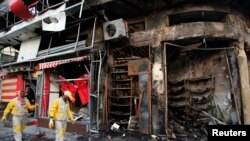Iraq is seeing its worst violence in recent years. The United Nations Assistance Mission for Iraq reports that nearly 9,000 people were killed in 2013. Some regional security experts in Washington believe that to tackle this bloodbath, the United States must work to help Iraqi political rivals end their differences.
Iraq's Shi'ite-dominated government is struggling to maintain security as two al-Qaida-linked groups, the Islamic State of Iraq and Syria ISIS, have driven Iraqi security forces out of the al-Anbar region west of Baghdad. Violence in other parts of the country in January killed more than 1,000 people.
Sarhang Hamasaeed, a senior program officer for Middle East and North Africa at Washington’s United States Institute of Peace, says Prime Minister Nuri al-Malki blames the deteriorating security situation on the Sunni insurgency, but that his government did not bring the Sunni minority into the political fold. Now, Hamasaeed says, al-Qaida is exploiting the situation.
"Now we see an intermix of violence that for some people is driven by legitimate grievances, but also seriously entangled with the resurgence of al-Qaida and its affiliated organization, the Islamic State of Iraq," he said.
Many regional experts think the key to end the violence is to bring different factions together and that the U.S. can help this effort.
"Right now, Iraq lacks a facilitator that can bring different parties together. The institutions or the state are not playing that role," he said. "The [Iraqi] president has been out for health reasons for over a year now. The parliament is not playing the role where the debates between different parties on the difficult issues happen. That facilitator role will be important for someone to play. And I think the U.S. is in a good position to play that role. Building peace is not just providing the weapons. On the process of political inclusion, the U.S. could provide advice and engage with its friends there."
Some experts think that in the absence of an active role by the United States and the West, Iraqi groups are looking toward Iran, which is getting more involved in Iraqi politics.
"The U.S. presence is not felt and the U.S. involvement is very weak," said Bilal Wahab, a professor at American University in the Iraqi city of Sulaimani. "For example, U.S. officials are rarely seen in meetings, in events, especially public events. They seem to be secluded in the embassy. Just compare that to the Iranian officials such as the Council General, who you can see downtown in the bazaar, walking around the city. He is quite visible. And even when there is tension in the government formation within political parties, you would see the political leaders jump on the plane and go to Tehran."
Next month, Iraq will hold its first parliamentary election since the U.S. troop withdrawal in 2011. Analysts such as Wahab and Hamasaeed say these elections should bring new leadership that could put Iraq on the road to political stability, and the new leaders will need close cooperation from Washington.
Iraq's Shi'ite-dominated government is struggling to maintain security as two al-Qaida-linked groups, the Islamic State of Iraq and Syria ISIS, have driven Iraqi security forces out of the al-Anbar region west of Baghdad. Violence in other parts of the country in January killed more than 1,000 people.
Sarhang Hamasaeed, a senior program officer for Middle East and North Africa at Washington’s United States Institute of Peace, says Prime Minister Nuri al-Malki blames the deteriorating security situation on the Sunni insurgency, but that his government did not bring the Sunni minority into the political fold. Now, Hamasaeed says, al-Qaida is exploiting the situation.
"Now we see an intermix of violence that for some people is driven by legitimate grievances, but also seriously entangled with the resurgence of al-Qaida and its affiliated organization, the Islamic State of Iraq," he said.
Many regional experts think the key to end the violence is to bring different factions together and that the U.S. can help this effort.
"Right now, Iraq lacks a facilitator that can bring different parties together. The institutions or the state are not playing that role," he said. "The [Iraqi] president has been out for health reasons for over a year now. The parliament is not playing the role where the debates between different parties on the difficult issues happen. That facilitator role will be important for someone to play. And I think the U.S. is in a good position to play that role. Building peace is not just providing the weapons. On the process of political inclusion, the U.S. could provide advice and engage with its friends there."
Some experts think that in the absence of an active role by the United States and the West, Iraqi groups are looking toward Iran, which is getting more involved in Iraqi politics.
"The U.S. presence is not felt and the U.S. involvement is very weak," said Bilal Wahab, a professor at American University in the Iraqi city of Sulaimani. "For example, U.S. officials are rarely seen in meetings, in events, especially public events. They seem to be secluded in the embassy. Just compare that to the Iranian officials such as the Council General, who you can see downtown in the bazaar, walking around the city. He is quite visible. And even when there is tension in the government formation within political parties, you would see the political leaders jump on the plane and go to Tehran."
Next month, Iraq will hold its first parliamentary election since the U.S. troop withdrawal in 2011. Analysts such as Wahab and Hamasaeed say these elections should bring new leadership that could put Iraq on the road to political stability, and the new leaders will need close cooperation from Washington.

